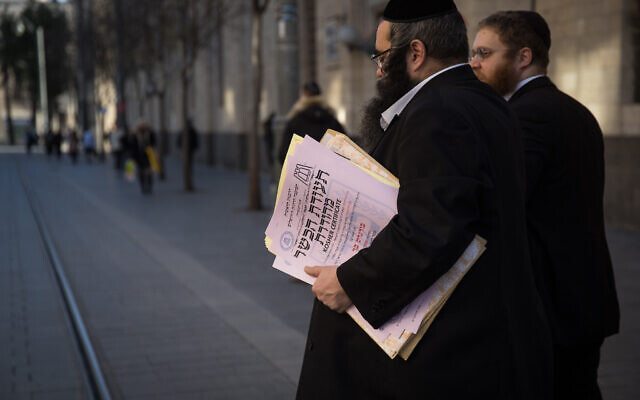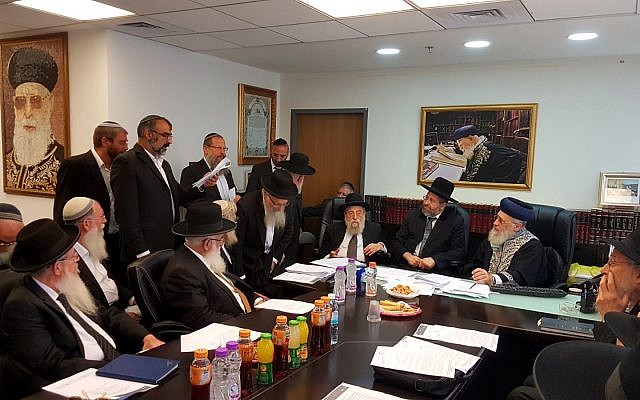Less than a third of Jewish Israelis say they have significant trust in the Chief Rabbinate, according to recent survey data from the Israel Democracy Institute.
The poll released last week, which assessed public trust in national institutions, found that 30 percent of Jewish Israelis in 2022 said they had “quite a lot” or “very much” trust in the Chief Rabbinate, the government body that oversees all official aspects of Jewish life in Israel, namely marriage, divorce, burial, conversion and kashrut certification.
This is the same level on average as in 2021, which can be seen as a slight victory for the rabbinate in light of the fact that the survey showed less faith in almost all other public institutions in 2022 compared to the year before.
Public faith in the Chief Rabbinate is particularly significant as the current government, the most religious in Israel’s history, has explicitly called for expanding Rabbinate’s power and limiting oversight, particularly in the rabbinic courts.
Get The Times of Israel's Daily Edition by email and never miss our top stories
People who identified as religious tended to have greater faith in the Chief Rabbinate than did those who said they were secular or traditional. Last year, 71 percent of ultra-Orthodox, or Haredi, Israelis said they had faith in the Rabbinate, as did 54 percent of national-religious Israelis, compared to 33.5 percent of people who said they were traditional and 9 percent of secular Israelis.
And yet, when looking at longer-term trends, public trust in the Rabbinate has been steadily decreasing over the past 20 years among all Jewish Israelis, from Haredi to secular.
This has been more pronounced among traditional and secular Israelis, where it has dropped from 50% and 32% in 2003, respectively, to their current levels of 33.5% and 9%. But it can also clearly be seen among Haredi and national-religious Israelis, which decreased from 80% and 76% in 2003, respectively, to their current levels of 71% and 54%.

Ultra-Orthodox representatives of the Chief Rabbinate cross Jaffa Road in Jerusalem as they deliver a kosher certificate to a local restaurant, on December 31, 2019. (Hadas Parush/Flash90)
The year 2017 saw a nadir of faith in the Chief Rabbinate, with only 20% of Jewish Israelis saying they trusted the institution. However, that appeared to be something of an outlier caused by a number of highly public scandals involving former chief rabbis that were widely covered in the press in the weeks preceding the poll.
Ariel Finklestein, an IDI researcher who focuses on the rabbinate and religion-and-state issues, said the steady decline in public trust in the Chief Rabbinate is likely a result of changes within the institution, namely that over the years it became more and more associated with Haredi Judaism.
“That’s true both in terms of the personalities and in terms of its rulings. This has an effect on public trust,” Finklestein told The Times of Israel.
On average, from 2003 to 2022, public trust in the Chief Rabbinate dropped from 46% to 30%.
While other public institutions have seen ups and downs over the years, the Chief Rabbinate has been on a relatively steady decline over the past 20 years. It also started out with far less trust than all other institutions save for political parties.
Does the Chief Rabbinate care that most of the Israeli public has no trust in it? That’s hard to say.
The Times of Israel contacted the Chief Rabbinate multiple times to discuss the matter, but after repeatedly promising to respond a spokesperson for the rabbinate said he was declining to comment.
Currently, the Chief Rabbinate does not particularly have to concern itself with the public’s feelings, as it has what economists refer to as a captive market. With few exceptions, Jewish Israelis have to go through the rabbinate for basic life events like marriage, divorce and burial, regardless of their feelings toward it. Indeed, it is technically illegal to have a religious marriage performed outside of the rabbinate, and while some Israelis opt to hold their weddings abroad in order to avoid the rabbinate, they would still have to go through a rabbinic court to receive a divorce.

Israel’s chief rabbis convene an emergency meeting with religious Zionist rabbis against a proposal to overhaul the conversion to Judaism system in the country on June 3, 2018 (Courtesy of the Chief Rabbinate)
Finklestein said this dynamic also likely feeds into secular antipathy toward the rabbinate.
“For secular Israelis, the Chief Rabbinate is something that is imposed upon them,” he said.
Finklestein said the Rabbinate is likely less concerned about secular Israelis’ trust in it than it is about religious Israelis.
“It’s an interesting question: if they care. I think any institution is going to be worried to some extent about public trust. But what’s more important is how ‘their public’ feels, what Haredi Israelis, what right-wing Israelis think of the rabbinate. They care about what traditional people think of them, not what secular Israelis think,” he said.


